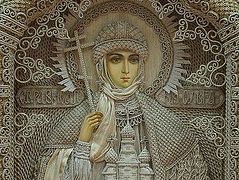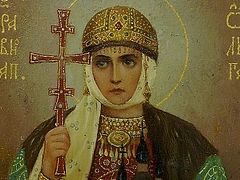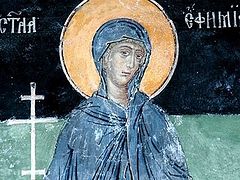 Holy Equal-to-the-Apostles Olga enters the church of Hagia Sophia in Constantinople. Artist: Igor Mashkov
Holy Equal-to-the-Apostles Olga enters the church of Hagia Sophia in Constantinople. Artist: Igor Mashkov
Everyone knows only one thing about holy Equal-to-the-Apostles Olga: how she got revenge against the Drevlyans for murdering her husband. This story is included in all the history classes in Russian schools, and strikes the imagination of even the laziest students. And they remember it.
But religious Orthodox Christians who read the lives of the saints or works on Church history know a few more things: how the Grand Princess went to Constantinople to receive Baptism, how she outsmarted the Byzantine emperor who fell in love with her, and tried unsuccessfully to convert her son Prince Sviatoslav to Christianity… And that is basically it.
How can we solve the problem here that I spoke of in another article on St. Sebastian: seeing behind several, not always true-to-the-facts episodes in a Saint’s Life the real image of a living person? How can we sense the podvig of her life?
Let’s begin with the story that everyone knows: her revenge.
The Derevlyans had their own tribal order, with fortified settlements, and they conducted wars and treaty negotiations… In a word, they hadn’t appeared on earth yesterday and they were not a population of the mentally retarded. Therefore, Princess Olga’s “outsmarting” them was not the result of a couple of clever ideas but of a whole series of carefully considered diplomatic, economic, psychological, and strategic moves. Which means that in this history we can see the image of a broadly gifted and very intelligent woman.
But a domineering and cruel woman! How many people were killed indiscriminately without any particular personal culpability, how many completely innocent people perished in the most terrifying manner!1 She got revenge against the Derevlyans according to all the rules of blood vengeance and using methods of barbarian terror. The princess was a true pagan—cruel, merciless, vengeful…
What happened to this soul, and how did she convert to Christ?
This is a mystery. And with this mystery she gives us a great lesson: Do not judge. Do not judge domineering, vengeful, and cruel people. We know nothing about people and in principal can not imagine how their conversion takes place, if it does take place…
What was Princess Olga’s conversion, and what were its fruits? This is not an idle question, considering the atheistic agitation that’s rearing its ugly head, which tries to explain all such conversions through political motives. Did this specific person change after accepting Christ?
Thus, when Sviatoslav was two years old, his mother showed herself to be of a proud, domineering, and vengeful nature. Eleven to twelve years later, and we see her in Constantinople, where, according to her Life, she went to learn about Christianity.
And here we run up against two contradictions in the text of her Life that could confuse someone disposed towards criticism.
Firstly, after the description of the vengeance against the Drevlyans comes the statement that even before receiving Christianity, Princess Olga shone with many virtues, the first of which was mercy. This is puzzling if you recall the horrifying details of her revenge… But it is quite explainable if you accept the version of Church historians that the princess had converted to Christianity long before her trip to Constantinople. This journey had another aim besides receiving Baptism.
But the second contradiction is harder to explain. The Life describes Princess Olga’s visit to Constantinople as a glorious and triumphant event—the basis for this was partially found back in the Primary Chronicles. But there, in the following paragraph, is a strange episode: Soon after Olga’s return from Constantinople, emissaries from the “Greek Tsar” come with a request that she send him the gifts that she supposedly promised. To the emperor’s request the princess replies: “If you stand with me at the Pochaina2, as I stood at the Judgment, then I will send them to you.” Here the chronicle clearly conveys echoes of some extremely long and insulting wait the princess had endured; certain unpleasant negotiations at which she had been a petitioner.
What really happened? There is obviously a conflict here, which means that the text of St. Nestor the Chronicler had been changed. But which of the two paragraphs was changed?
I think it was in the first. St. Nestor, who described without embellishment how the right-believing Prince Gleb begged not to be killed, would hardly have artificially sought divine glory in a person’s outward success. However, editors of later times might well have done so.
The Russian Church historian Golubinsky has the following to say about such later insertions into the Chronicles:
"Our ancestors might not have been infected with ambition or thought about its satisfaction right after they received Christianity, but only after they had more or less settled into Christianity and it had more or less solidly established itself in their country, and they might have been motivated by their pride."
We are talking here not about ambition or pride, but about a prideful sense of one’s own piety.
Bitter are these words, bitter! How often do we step across the threshold of the church for the first time with the sincere feelings of the repentant publican: “God, have mercy on me a sinner!!!” but then two or three years go by and we are already looking proudly around us: “I am not like the rest! I fast, I pray…”
Alack and alas, there was no reception in Constantinople “with great honor”, no proposal to become the empress, no earth-shaking solemnities at Olga’s Baptism—all that appeared in the later chronicles and made its way from there into her Life… There was no naïve Byzantine emperor who didn’t know the canons3, nor could there have been.
There was an embassy of the widowed princess of the Rus’, whom the imperial aristocracy, well aware of the their own worth, received only in order to establish tolerable relations with the restless barbarian tribes on its borders. There was the desperate attempt of a mother to betroth her son, still young and not yet hardened in paganism, to a Christian princess; there were the ruler’s sacrificing efforts to strengthen the position of Christianity in her nation through a dynastic marriage.
Why “sacrificial”?
Because the Greeks did not foresee any great Christian future in this barbarian nation. The betrothal did not take place, and the embassy left with nothing. But not right away. The proud woman beat the paths to the palace for half a year, for half a year endured condescending glances and florid refusals. She, the successful ruler of several million citizens and an enormous territory, endured this humiliating situation for the sake of her people’s Christian enlightenment!
Can there be podvigs any greater than the voluntary endurance of humiliation for the sake of others? Do many people manage to rise to such a form of self-denial?
She was not raised on Biblical traditions that praise meekness, she had never heard the words of the Prophet about the Lord, A bruised reed shall he not break, and smoking flax shall he not quench (Mt. 12:20; Is. 42:3). She was raised on hubris and braggadocio, arrogance and extravagance. From her very cradle she was fed with praise of cruel daring, where pillaging and all-destroying invasions were called “warriors’ feats”.
What were the pagan princes of Rus’ like, and in what did their role as rulers consist?
They strove to win “battle glory” for themselves. And that’s basically it. Well, that is, they went on campaigns to their neighbors for booty and fought off their neighbors when they came to take booty from them. The majority of occupations in the nations’ internal affairs boiled down to having something to take with them on their raids and something to fight off raiders: tribute money and trade customs, fortifications, trained armies… Incidentally, tribute collection often turned into a way to seize booty—that is how Olga’s husband died. To put it briefly, all the interests of those princes were the interests of raiders, and nothing more.
And so, to Olga’s Christian conscience it became obvious that for the sake of the nation was needed a feat much greater than battle daring. For the sake of the nation she needed to endure and bow down, to mingle, request, be economical, be cumbered about with much care… After all, the history of her “stand” in Constantinople is only one episode in her life, her great Christian podvig.
St. Olga laid the foundation for the dawn in Rus’, placing all the powers of her soul in service to her people, to care for its enlightenment, good order, and prosperity. And those powers were unusually great—the colossal scope of her personality is beyond doubt. During the reign of Equal-to-the-Apostles Princess Olga the country crossed the symbolic border of barbarianism and stepped onto the path of civilization.
It would seem, Princess Olga simply received Christianity like any one of us… But her joy in the Lord poured over the brim with SUCH a sense of duty as would evoke reverent awe—truly this was a podvig “in the image of Christ”.
She truly became a mother of all, which is why she was mourned not only by the simple folk, but even the grim prince and his warriors could not hide their tears.
Her title of “Equal-to-the-Apostles” is no exaggeration! In her weak feminine nature, Princess Olga emerged from the darkest paganism to profound Christian self-sacrifice for the sake of her neighbor—and the whole nation became her neighbor!




